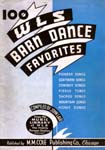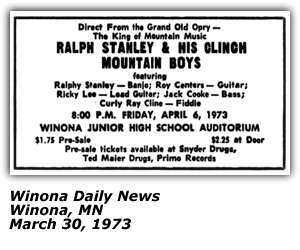



|
 |
|||||||||||||||||||||
|
About The Artist Curly Ray Cline, a fiddler of Mingo County, West Virginia origins, had two long stretches in his musical career. The first came with the Lonesome Pine Fiddlers which extended from about 1938 until 1965 and the second from about 1966 until his retirement in late May 1993 with Ralph Stanley's Clinch Mountain Boys. In the latter period he also recorded a dozen solo fiddle albums, most of which also contained a touch of vocal and comedy. Growing up in the rugged area around Gilbert, West Virginia, Cline learned to play fiddle at an early age and was about fifteen when his cousin Ezra Cline put together a string band he called the Lonesome Pine Fiddlers and secured a radio program at WHIS Bluefield (whether daily or weekly is uncertain). Ezra played bass fiddle and emceed. Curly Ray fiddled, his brother Ireland (termed Lazy Ned) played tenor banjo, and non-relative Gordon Jennings played guitar. Later a younger brother Charlie (b. 1931) played banjo and also acquired fiddle skills. When World War II broke out gas rationing caused them to abandon the radio program. Ned Cline joined the service and was killed in action at D Day. In 1945, they resumed radio work at WHIS where Ray and Charlie had a Delmore-style vocal duet. Ironically, neither Curly Ray nor Charlie were band members when the Fiddlers made their first recordings. Curly was working in a coal mine. But he was fiddling on all their other recordings. Although it may seem odd, that while in later years Curly Ray did not sing much, he taught virtually all the later band members their vocal parts. The first Lonesome Pine Fiddler recordings were made in 1950 on the small Davis, West Virginia-based Cozy label in the WHIS studio. Curly Ray was not in the band at the time and most of the excitement came from the young team of Bob Osborne and Larry Richardson. The number "Pain in My Heart" gave the band a strong bluegrass identity and so they remained for the rest of their existence. Curly Ray soon rejoined them and the band signed with RCA Victor. His fiddling was one of the highlights of the 22 recordings they made through 1954. By late 1953, they were based at WLSI in Pikeville, Kentucky. The band made no more recordings for the next seven years, but for a few months in 1958 they adopted a more modern country sound and did TV at WSAZ Huntington with Lee Cline-Charlie's wife-prominently featured. However, they soon returned to a bluegrass sound. From 1961 to 1964, they recorded extensively for Starday and continued in radio at Pikeville while doing a weekly TV show at WCYB in Bristol. Curly fiddled a bit on recordings for others in this era including Jimmy Martin and Bob Osborne on King, Rex and Eleanor Parker on Coral, and Hobo Jack Adkins on various small labels.
  By the mid-sixties, the Lonesome Pine Fiddlers were not playing much and Curly Ray jumped at a chance to join the Stanley Brothers band. From May 1966, he played several shows on an irregular basis from the time they came back from a European tour in March until Carter became terminally ill in October. Some weeks after Carter died on December 1 and Ralph decided to go on, he hired Cline as a regular fiddler. He remained as such for 27 years until his retirement in late May 1993. During this time, Ralph allowed Curly to record and sell his fiddle albums and other souvenirs such as key chains which he hawked zealously. Over that period he recorded not only on all of Ralph Stanley's recordings, but made nine albums of his own fiddle music. The first two albums contained a tune or two featuring a gimmick such as barking fox hounds or braying mules, but thereafter he did a song or two, usually of a comic nature and a parody. For instance a song about his wife, "Blue-Eyed Verdie," borrowed from "Black-Eyed Susie." "Why Me Ralph" parodied the sacred favorite "Why Me, Lord." "Just-a-Hangin'" told of one of his hounds dying when his chain got caught jumping over a barbed-wire fence, a parody of John Anderson's big hit, "Swingin.'" Curly Ray Cline was 70 years old in the spring of 1993 when Ralph Stanley reportedly decided unilaterally that it was time for him to retire. Ralph so announced it at his Memorial Day weekend festival, giving Curly a surprise that was not entirely welcome. Ralph supposedly did it because he had a chance to hire Art Stamper that could not be delayed. Others thought that Cline just sort of wasted away after that, passing on four years later. Melvin Goins—long time friend of both men—later said that Curly Ray virtually died when Ralph let him go. Whatever, one of the most colorful fiddlers of his time so departed the scene. Credits & Sources
|
| Printer Friendly Version |
Hillbilly-Music.com
Yes, Hillbilly Music. You may perhaps wonder why. You may even snicker. But trust us, soon your feet will start tappin' and before you know it, you'll be comin' back for more...Hillbilly Music.
Hillbilly-music.com ...
It's about the people, the music, the history.
|
Copyright © 2000—2023 Hillbilly-Music.com
|
||||